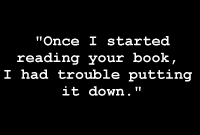Trip Report: Southern California Writers' Conference
by Matthew Arnold SternWould you drive 150 miles
a day round trip to become a better writer? I did. I attended the Southern
California Writers' Conference in San Diego 15--17 February, 2002. Because
I was going on my nickel, I had the brilliant idea of commuting from my
home in Orange County. I probably could have saved on hotel costs just as
effectively by crashing at one of those all-night read and critique
sessions (which lasted until five in the morning). The conference
was well worth the money and well worth the drive. I got information that
will help me finish my novel, including an excellent critique by the San
Diego Writers' Monthly Lifetime Achievement honoree, Betty Abell Jurus. I
got a better insight on how the publishing industry really works, which
will help me when my novel is ready to submit. Most importantly,
I got a lot of support and encouragement from the other attendees at the
conference. The agents and publishers were also willing to share their
knowledge.
Here are the top ten things I learned at the conference:
1. Put together a great pitch for your book: One of the speakers
said, "Imagine that you are standing on a corner, waiting for the
light. An editor from Random House comes up to you and asks you about your
book. How can you describe it before the light turns green?" Put
together a great brief summary of your book that can excite an editor or
agent. If your book cannot be easily summarized or explained, how can you change it so it can? 2. Learn to
edit manuscripts yourself: There are plenty of editing services that
can polish your manuscript, but the editors might not understand your
intentions or appreciate your nuances. Instead, use techniques such as
reading the manuscript aloud or reading it backwards to polish your
material before submission. When you get feedback, review it critically
and revise according to what works best for your book. 3. Put
together an effective query letter: Keep your query to one page.
Include a hook sentence, the pitch you put together for your book, a brief
biography, and a thank you. Don't use any gimmicks, like cutesy fonts and
scented paper. Don't mention that you are sending multiple queries; agents
or publishers assume this. 4. Query
agents who would best represent your book: Agents send
manuscripts to editors who they feel would be the best fit for that type
of book. So, you need to find out which agents would best represent the
type of book you are writing. Most agents list the genres and styles of
writing they prefer to represent in their submission guidelines. Also,
pick up a novel similar to yours and look at the
acknowledgement page. Who is the agent that the author thanked? Then,
research where the agent is now. Agents change jobs frequently, so get the
latest information. 5. Don't give an agent or editor a reason to reject your
manuscript: Make the manuscript as flawless as possible and follow the
submission guidelines set out by the agent or publisher. Anything that
stops an agent or editor from reading, such as typos, unclear sentences,
incorrect format, inappropriate shifts in point of view, are likely to get a manuscript
rejected. Manuscripts that don't follow the submission guidelines or sent
unsolicited are
likely to earn a trip to the slush pile. 6. Consider sales and marketing:
Sales
and marketing departments at publishing houses sit in on meetings
where editors select which books to buy. Are you writing a book that can
sell well? 7. Know that first novels are an easier sale than second and
third novels: Publishing houses would love to find the next John
Grisham, so they are willing to consider a first-time novelist. Once
you've sold a novel, publishers consider your previous sales and profit
record. If your record for your first novel isn't up to their
expectations, publishers might not consider your next one. 8. Be
prepared to market your book yourself: Unless you're a John Grisham,
Steven King, or other author who commands a seven-figure advance,
publishers aren't going to pay for a national book tour for you. Use some
of your advance to travel to promote your book. Line up your own book
signings and interviews. 9. Network: Like any other business,
publishing runs on personal connections. Your manuscript is more likely to
be read by someone you met or has heard of you, than if it is just another
envelope in the inbox. This is why conferences like this one are so
valuable. Also, get involved in writers' groups and e-mail lists. 10.
Support the industry that you want to support you: Buy books or check
them out from the library. (Publishers also make manuscript buying
decisions based on checkout records from libraries.) Go for books from new
and mid-list writers, because your support enables them to get published
again, and you will find some great writing. Purchasing best
sellers also helps the publishing industry, because their sales fund the
purchase of books from new and mid-list writers. The organizers of the
Southern California Writers' Conference will have another conference in
Oxnard 4--6 October, 2002. Use the links to the left to find out more
about this event and visit some useful Web sites that I found out about at
the conference. My advice: if you go, get a hotel room.
Oxnard is a lo-o-ng drive from Orange County. Related Topics
Novel Status
Speeches
Communication Tips
Technical Writing Tips
Writing
Links
Southern California Writers'
Conference
Writers' Showplace, Inc.
Publishers Marketplace
Write Brain
More Links |



